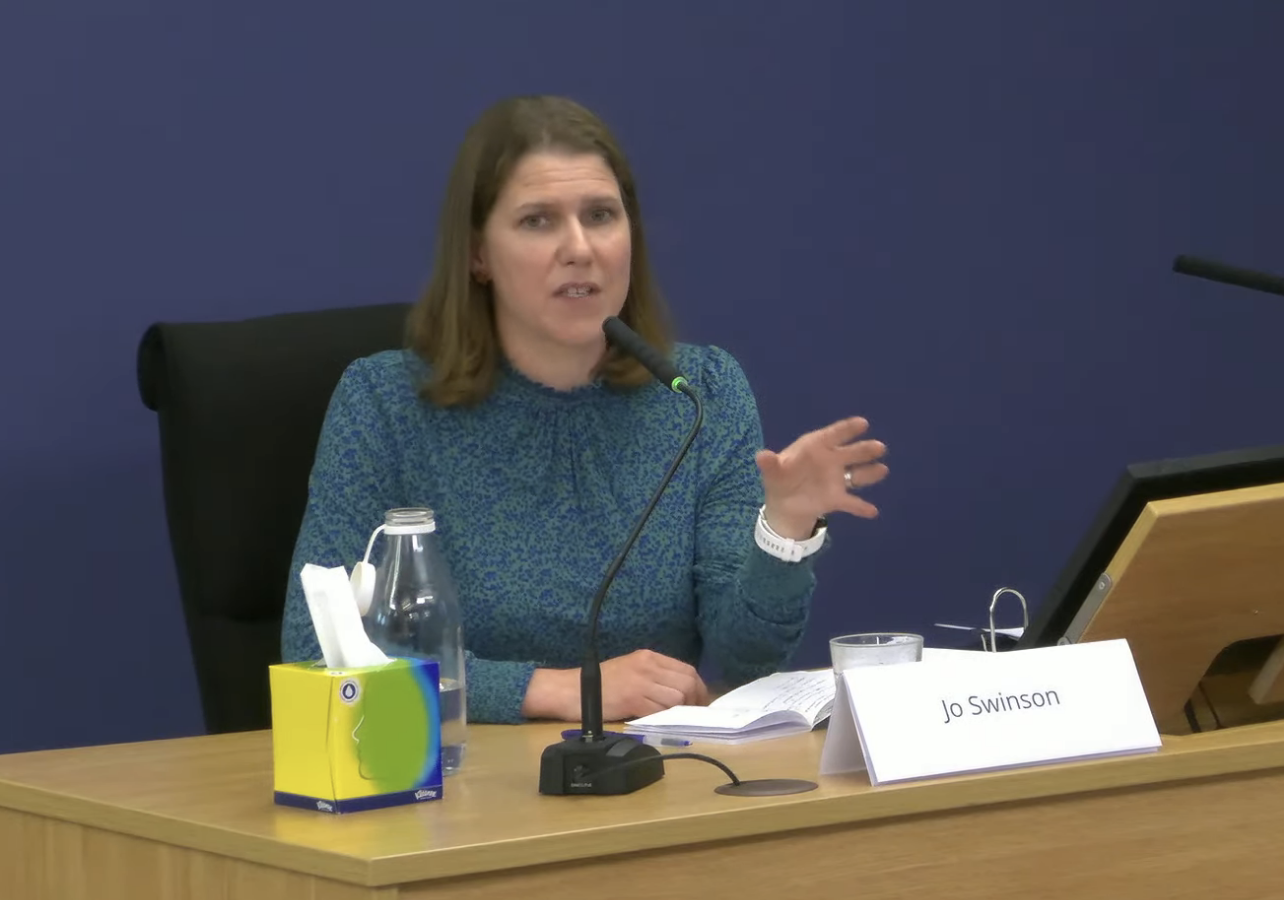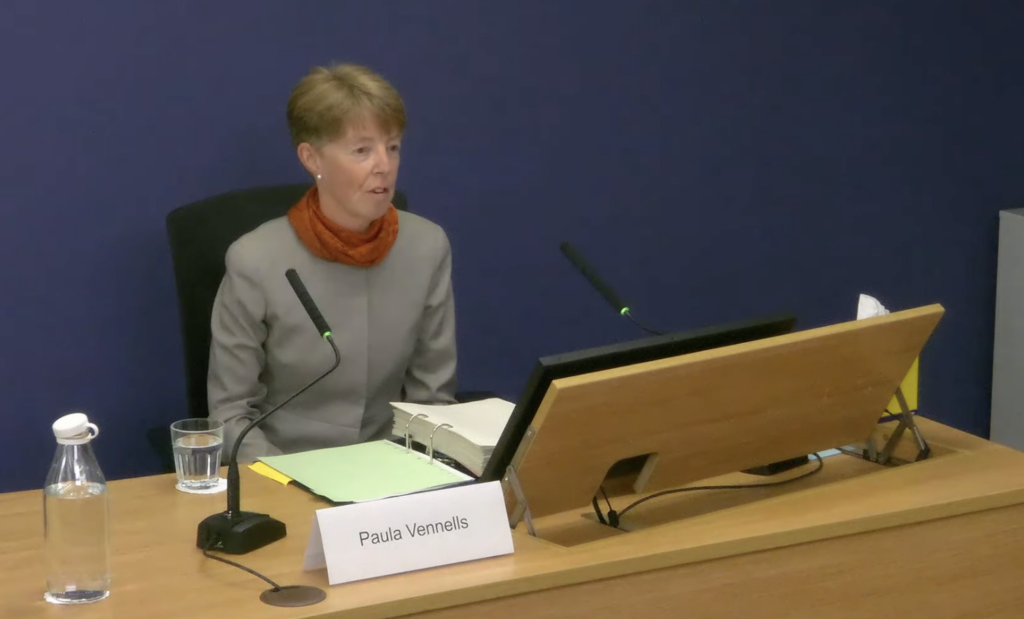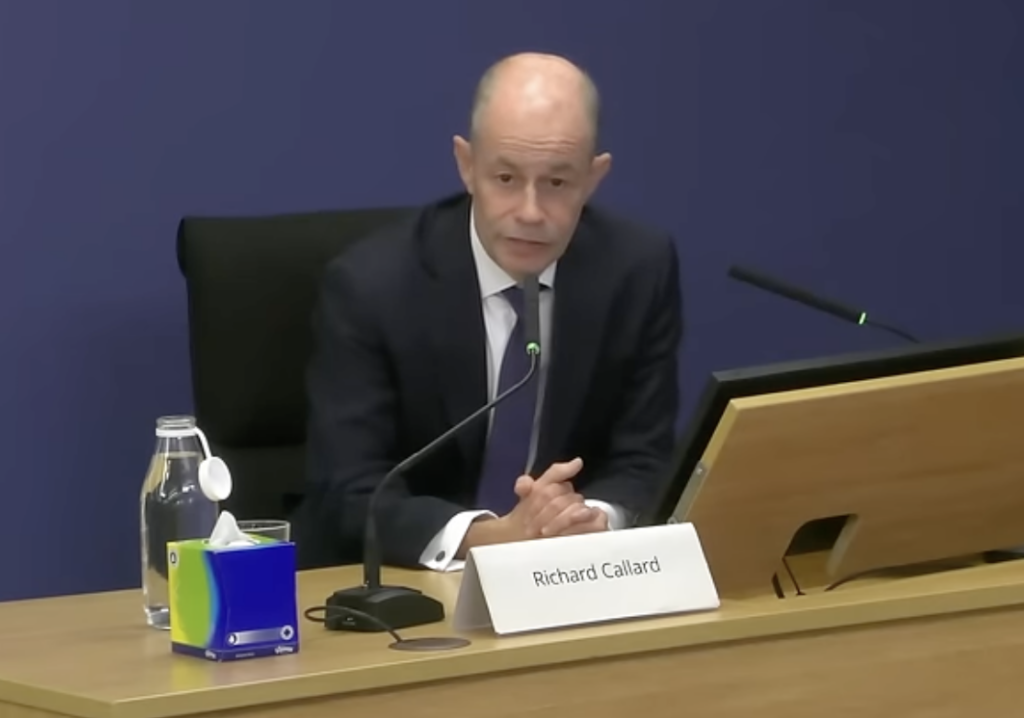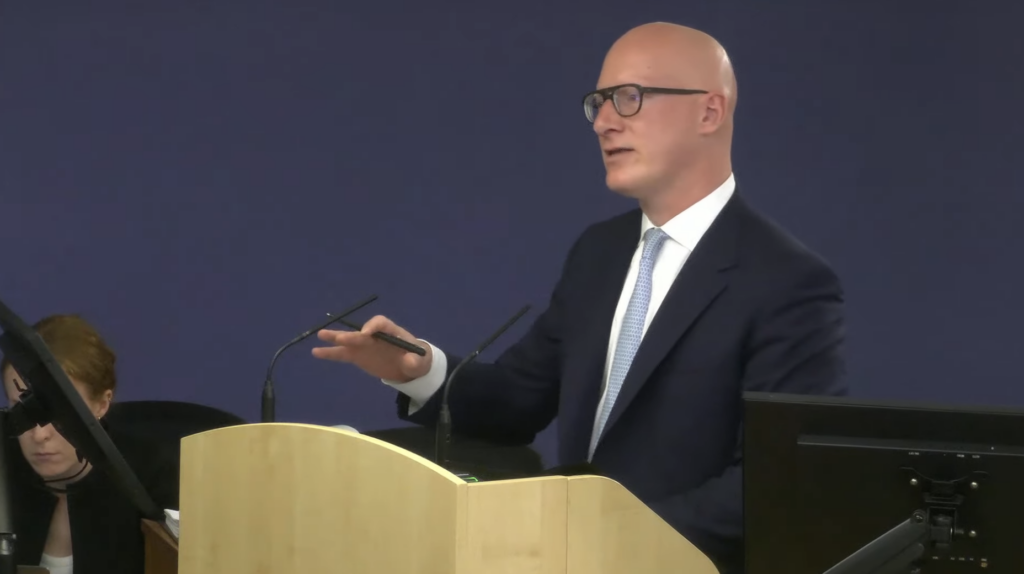
During her evidence to the Post Office Horizon IT Inquiry former minister Jo Swinson today highlighted the mendacity of the Post Office and what she saw as the conniving “duplicitous” behaviour of her chief civil service advisor.
It all centres on the first Clarke Advice, the legal document written in July 2013 which was kept hidden from the government, MPs, campaigners and their lawyers until it was finally dragged out of the Post Office during the Court of Appeal hearings in 2021.
The Advice informs the Post Office that it has been using an unreliable witness (Gareth Jenkins) in its prosecutions of Subpostmasters. It states Jenkins’ evidence has been fatally undermined and that all Post Office prosecutions need to be reviewed. Today Swinson called it a “bombshell” and told the Inquiry she was “staggered” that no one at the Post Office told her of its existence.
It appears Swinson read it for the first time whilst preparing for the Inquiry. Today she said: “I’m not a lawyer but when I read that, when I saw that document in the briefing notes I couldn’t believe it. You do not need to be a lawyer. How could anyone read that document and not realise that this is something which demands urgent attention?”
Eye to Eye
The advice was written by Simon Clarke, a criminal barrister whose firm was engaged by the Post Office to prosecute Subpostmasters. It was triggered by the production of independent investigators Second Sight’s interim report which suggested the Horizon IT data used to prosecute Subpostmasters was potentially unsound.
Swinson told the inquiry that Paula Vennells, the Chief Executive of the Post Office, clearly knew about the Clarke Advice and yet didn’t tell her. Towards the end of her evidence session, Swinson was taken to a letter written by Paula Vennells about the termination of Second Sight and the closure of the mediation scheme, which happened on Swinson’s watch. In the letter, amongst other reassurances, Vennells says:
“Having now completed its reinvestigation of each of the cases, Post Office has found no reason to conclude that any original prosecution was unsafe.”
Swinson told the Inquiry: “I just want to be clear as well that this was not only a set of assurances that were given to me in writing, these were assurances that Paula Vennells delivered to me in person across the table, looking me in the eye and telling me that there was no problem: that they had investigated, that they had not found anything that would cause concern, which I cannot square with that email that I have now seen that she sent in October 2013… about an unsafe witness and their obligations of disclosure.”
Woman of the Cloth

In Swinson’s mind this was damning. “She knew about the Clarke advice and the lack of credibility of the key witness that they had relied on for so many prosecutions. I consider that she did not tell me that at the time – in the summer and autumn of 2013 – to be massively problematic, nor at any point in the subsequent 18 months, in any of our catch-ups.”
For Swinson, that Vennells “would sit and look me in the eye and give me those assurances and then put that in writing… it just beggars belief because she knew that there were… problems with convictions and the investigations and the safety thereof, because she had been told that in the Clarke memo.”
Possibly playing to gallery, but equally perhaps articulating the same disgust many members of the public feel towards Vennells, Swinson told the Inquiry: “You know, in that first briefing note [given to her before she first met with Paula Vennells in 2012], one of the bullet points which I remember – because it was unusual – was that Paula Vennells is also an ordained vicar. So she was sitting there, yes as the chief executive of a national organisation… but she was also sitting there with the moral authority of somebody who was a minister of the cloth, not of some kind of slick chief executive who seemed to care only about profit. And I believed her. I believed her…”
After lunch, Samantha Leek KC, who represents Paula Vennells, took this up with Swinson.
“Are you aware that there is no evidence to suggest that Ms Vennells was ever shown either of the Simon Clarke advices by Susan Crichton or any other post office lawyer before she left the Post Office?” she asked.
Swinson replied: “I’ve been shown an email from October 2013 where Paula Vennells emails Alice Perkins [Post Office chair]… I may not remember precisely, but it basically says along the lines of ‘my concern about Horizon… is our obligations of disclosure regarding an unsafe witness’, which to me says that she knows that there was an unsafe witness and therefore is referring to the Clarke Advice.”
Leek said: “Is it right to say then the extent of your knowledge about what Paula Vennells was told is based on that particular email?”
“Well she certainly didn’t tell me about it, and I wish she had”, replied Swinson.
“Yes” said Leek, “but I’m trying to explore with you what you knew about what she had been told about the Simon Clarke advices and I want to establish is that based solely on that email?”
“For me it’s clear she knew of the at least existence of the Clarke Advice and I would have thought that any chief executive being given information of that level would have asked to then see the document on which that came from, but I don’t know if she did or didn’t”, admitted Swinson.
Paula Vennells is adamant she didn’t see the Clarke Advice during her tenure as CEO of the Post Office. But how much did she know about it? The October 2013 email from Paula Vennells to Alice Perkins is not clear. In it, Vennells writes:
“My concern re Sparrow [the Post Office codename for Horizon issues] currently is our obligations of disclosure, re an unsafe witness… We do not think it is material but it could be high profile.”
Asked about this when she gave evidence in May, Vennells said: “the adjective “unsafe” is not something that – in relation to the word “witness” – is quite a specific description, and I’m not sure that that’s something that I would have just used coincidentally. And when I looked at this email, this is some considerable time, so this is three months after I found out about Mr Jenkins being stood down. So I don’t know whether, at this stage, I had been given more information about him or not.”
Richard Canard
Another villain in Swinson’s mind is her senior advisor on Post Office matters, Richard Callard, who also happened to be the government’s representative on the Post Office board. Callard came across as a slimy individual when he gave evidence to the Inquiry last week, and it seems Swinson holds him responsible for keeping important information from her and potentially undermining her position.

In her witness statement, Swinson says Callard “one of the key officials who was supposed to support me in my Ministerial role with regard to Post Office matters, instead using his Departmental position, access and contacts to work on behalf of POL [Post Office Ltd] to seek to persuade me to do what POL wanted”.
This included trying to bounce Swinson into approving a payoff for a Chief Financial Officer the Post Office and the government’s Shareholder Executive (ShEx) wanted to sack, withholding concerns about Paula Vennells’ performance as chief executive and more sinisterly – trying to undermine Second Sight, the independent investigators loathed by the Post Office because they were intent on getting to the truth of the scandal and were uncovering highly damaging information. It was Callard who informed Swinson that there were concerns Second Sight had “gone native” to the Postmasters’ cause and Callard who withheld information about the Post Office’s intention to sack them.
Swinson wrote in her Witness Statement: “It never occurred to me at the time that information from ShEx might be anything other than fully accurate. Indeed, my experience of the civil service was one of extreme caution in terms of establishing facts… In hindsight, I now question whether the ShEx officials were acting as the Government’s representative on the POL Board or the POL Board’s representative in Government. It seems it may have been they who had ‘gone native’, not Second Sight.”
In one briefing paper Richard Callard sent to Swinson about the Subpostmaster cases going through the mediation scheme, Callard wrote:
“In those cases that have been mediated or settled, POL considers it should have conducted itself better operationally, but it is important to stress that these are not system related.”
It transpired that the Post Office Project Sparrow subcommittee was deliberately funnelling cases through the mediation scheme which did not concern Horizon problems. The evidence for this came from a Sparrow subcommittee meeting minute which states “it was agreed that effort should be made to try and accelerate cases that were not thematic and might be useful to show the Minister”.
Years of Anguish
Swinson only found out about this when reviewing all the papers provided to her to aid her preparation for the Inquiry. She told the Inquiry:
“When I look at the Sparrow minutes from April, where it is minuted that they should accelerate the specific cases that are not thematic because it might be useful to show the Minister, I consider that that is a premeditated manipulation process specifically designed to reassure me that there isn’t a problem by presenting cases which are not representative. As one would imagine in anything like this, there might be some simpler cases, by presenting those as representative of the vast number of postmaster cases… to me that just feels duplicitous, to actually set out to prioritise those cases so that they can then pretend to me that those are representative.”

Towards the end of her evidence, Julian Blake, who was asking questions on behalf of the Inquiry, suggested to Swinson it might be easy for politicians to blame the Post Office or their officials. He asked her instead to reflect on what she did “to contribute to the scandal”.
Swinson answered: “I should have met with Sir Alan Bates. I wished I’d asked to meet with Second Sight directly. I wish on a couple of occasions I had pushed more and probed more. One of those was when I was told that the Post Office was changing their prosecution policy and I wasn’t told that in a formal briefing, it was off the cuff, and I think my response at the time was kind of relief…”
Swinson realised relief was the wrong response: “I wish I’d asked more questions at that point because I suspect that… ultimately, if post office had been frank about that advice they’d received… years of anguish could have been saved for Subpostmasters, just as could have been years earlier if that Clarke [advice] had been properly acted upon at the time. And I didn’t know about it and I wish I had.”
Swinson finished with an emotional: “I’m just really sorry that I asked lots of questions and it wasn’t enough.”
Additional notes and quotes
Swinson’s fury
Swinson was “furious” with the Post Office for their delayed response to the 17 Dec 2014 Westminster Hall debate. Swinson said “MPs were forcefully putting forward points on behalf of their constituents and receiving an entirely different story from the Post Office, and that was very difficult for me. go into each case and start looking through spreadsheets and try to work out… I didn’t have the skill set to do that.. and try to work out who was right and who was wrong.” Swinson told the Post Office to send the Post Office mediation scheme and the independent investigations to MPs so they could have a clearer idea of what was going on with their individual constituents.
It took the Post Office until 15 January to deliver its general rebuttal to the MPs claims during the Westminster Hall debate. Swinson told the Inquiry: “I was actually pretty furious. I mean, this is the 15th of January. The debate was on the 17th of December, right? Most of us took Christmas day off and I had some time with the family but we’re working hard. Sir Alan Bates was working hard sending a letter on the 22nd of December. The fact that Post Office hadn’t pulled their finger out to get this response sorted quicker than basically four weeks after the debate felt to me to be ridiculous.
They’re “at it”
In her witness statement, Swinson wrote:
“I recall Ms Vennells explaining to me in a tone of taking me into her confidence, with something of a pained expression, that while it was a sad situation, the reality was that some subpostmasters ‘had their fingers in the till’ or something to that effect.”
Asked about it at the Inquiry, Swinson told Blake: “I’ll be really straightforward, I’m not going to be able to give you the exact words that Paula used. It was more than a decade ago… But what she was trying to clearly… explain to me, was… although these might seem to be lovely people, clearly some of them are just ‘at it’ is what she was trying to convey. It was that kind of tone of ‘we have looked into this and it is very sad but that is just the reality and so we have to act’.”
Tail wagging the dog
In what I thought was a revealing aside, Swinson told the Inquiry that in the first weeks of her tenure, she wasn’t entirely sure what was in her portfolio. This is possible understandable given she had two jobs in two different ministries, being Parliamentary Under-Secretary of State for Employment Relations, Consumer and Postal Affairs in the Department for Business Innovation and Skills (“BIS”) and Parliamentary Under-Secretary of State for Women and Equalities in the Department for Culture, Media and Sport (“DCMS”).
Swinson told Blake:
“I mean, there was lots of bizarre things that you wouldn’t necessarily assume were in the portfolio. So I would often find out what was in my portfolio when I would receive correspondence that I was being asked to answer.”
I suspect it suited the civil servants to tell her as little as possible. This suggests they did.
For blow-by-blow updates on Swinson’s evidence and the documents which reveal what she did and didn’t see as minister, click here.
The journalism on this blog is crowdfunded. If you would like to join the “secret email” newsletter, please consider making a one-off donation. The money is used to keep the contents of this website free. You will receive irregular, but informative email updates about the Post Office Horizon IT scandal.

Leave a Reply